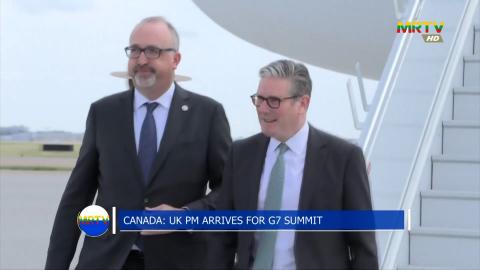India and Canada agreed Tuesday to return ambassadors to each other's capitals. Canadian Prime Minister Mark Carney, who took office in March, invited Modi to the Canadian Rockies as a guest at the summit of the Group of Seven major economies.
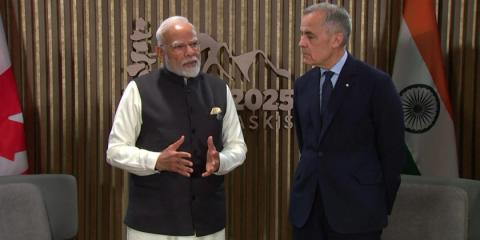
India and Canada agreed Tuesday to return ambassadors to each other's capitals. Canadian Prime Minister Mark Carney, who took office in March, invited Modi to the Canadian Rockies as a guest at the summit of the Group of Seven major economies.
Carney said he hoped the meeting would "provide the necessary foundations to begin to rebuild the relationship, based on mutual respect, sovereignty, trust." "He would describe it as foundational as a necessary first step, a frank, open exchange of views around law enforcement, transnational repression," he also told a news conference. He noted that India is invited each year to G7 summits of major industrial democracies, pointing to the size of its economy.
mitv
India and Canada agreed Tuesday to return ambassadors to each other's capitals. Canadian Prime Minister Mark Carney, who took office in March, invited Modi to the Canadian Rockies as a guest at the summit of the Group of Seven major economies.
Carney said he hoped the meeting would "provide the necessary foundations to begin to rebuild the relationship, based on mutual respect, sovereignty, trust." "He would describe it as foundational as a necessary first step, a frank, open exchange of views around law enforcement, transnational repression," he also told a news conference. He noted that India is invited each year to G7 summits of major industrial democracies, pointing to the size of its economy.
mitv
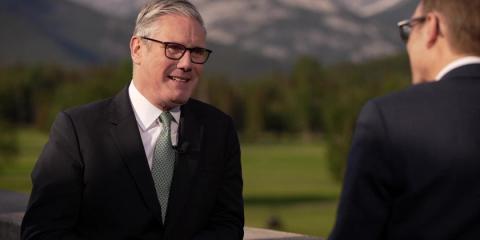
UK Prime Minister Keir Starmer has reiterated his call for de-escalation in the Middle East amid escalating tensions between Israel and Iran. He emphasized the need for all parties to "step back from the brink" to prevent further regional instability.
UK Prime Minister Keir Starmer has reiterated his call for de-escalation in the Middle East amid escalating tensions between Israel and Iran. He emphasized the need for all parties to "step back from the brink" to prevent further regional instability.
At the recent G7 summit in Kananaskis, Alberta, Canada, Starmer expressed deep concern over the situation, stating, "He do think there's a consensus for de-escalation." He highlighted the importance of diplomatic efforts to address the crisis and prevent it from spiraling into a broader conflict.
mitv
UK Prime Minister Keir Starmer has reiterated his call for de-escalation in the Middle East amid escalating tensions between Israel and Iran. He emphasized the need for all parties to "step back from the brink" to prevent further regional instability.
At the recent G7 summit in Kananaskis, Alberta, Canada, Starmer expressed deep concern over the situation, stating, "He do think there's a consensus for de-escalation." He highlighted the importance of diplomatic efforts to address the crisis and prevent it from spiraling into a broader conflict.
mitv
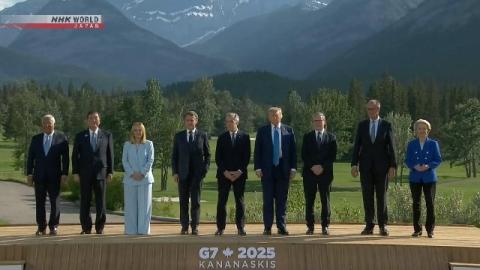
The White House says President Donald Trump will leave early from the Group of Seven summit in Canada and return to Washington.
In a social media post on Monday, Press Secretary Karoline Leavitt said, "because of what's going on in the Middle East, President Trump will be leaving tonight after dinner with Heads of State." She cited the "many important matters" the president needs to attend to. Trump is expected to get back to work at the White House to deal with rising tensions in the Middle East.
The White House says President Donald Trump will leave early from the Group of Seven summit in Canada and return to Washington.
In a social media post on Monday, Press Secretary Karoline Leavitt said, "because of what's going on in the Middle East, President Trump will be leaving tonight after dinner with Heads of State." She cited the "many important matters" the president needs to attend to. Trump is expected to get back to work at the White House to deal with rising tensions in the Middle East.
Ref : NHK
The White House says President Donald Trump will leave early from the Group of Seven summit in Canada and return to Washington.
In a social media post on Monday, Press Secretary Karoline Leavitt said, "because of what's going on in the Middle East, President Trump will be leaving tonight after dinner with Heads of State." She cited the "many important matters" the president needs to attend to. Trump is expected to get back to work at the White House to deal with rising tensions in the Middle East.
Ref : NHK
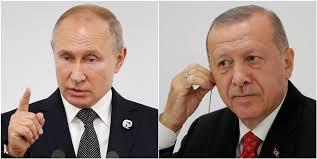
MOSCOW June 16
Russian President Vladimir Putin had a telephone conversation with his Turkish counterpart, Recep Tayyip Erdogan, to discuss the situation in the Middle East and Ukraine, the Kremlin said on Monday.
"Putin and Erdogan condemned Israel's use of force against Iran, which violated the UN Charter and other norms of international law," the statement said.
MOSCOW June 16
Russian President Vladimir Putin had a telephone conversation with his Turkish counterpart, Recep Tayyip Erdogan, to discuss the situation in the Middle East and Ukraine, the Kremlin said on Monday.
"Putin and Erdogan condemned Israel's use of force against Iran, which violated the UN Charter and other norms of international law," the statement said.
The statement said both sides expressed the most serious concern over the ongoing escalation of the Iran-Israel conflict, which has already caused a significant loss of life and poses long-term consequences for the entire region. The two leaders called for an immediate cessation of hostilities and urged both sides to settle their differences, including those related to Iran's nuclear program, through political and diplomatic means.
Putin expressed gratitude to Erdogan for providing organizational support for the direct talks between Moscow and Kiev, noting that Russia has strictly adhered to the agreements reached during the Russia-Ukraine talks in Istanbul on June 2, including the return of bodies of dead service personnel and the exchange of prisoners of war.
Xinhua
MOSCOW June 16
Russian President Vladimir Putin had a telephone conversation with his Turkish counterpart, Recep Tayyip Erdogan, to discuss the situation in the Middle East and Ukraine, the Kremlin said on Monday.
"Putin and Erdogan condemned Israel's use of force against Iran, which violated the UN Charter and other norms of international law," the statement said.
The statement said both sides expressed the most serious concern over the ongoing escalation of the Iran-Israel conflict, which has already caused a significant loss of life and poses long-term consequences for the entire region. The two leaders called for an immediate cessation of hostilities and urged both sides to settle their differences, including those related to Iran's nuclear program, through political and diplomatic means.
Putin expressed gratitude to Erdogan for providing organizational support for the direct talks between Moscow and Kiev, noting that Russia has strictly adhered to the agreements reached during the Russia-Ukraine talks in Istanbul on June 2, including the return of bodies of dead service personnel and the exchange of prisoners of war.
Xinhua
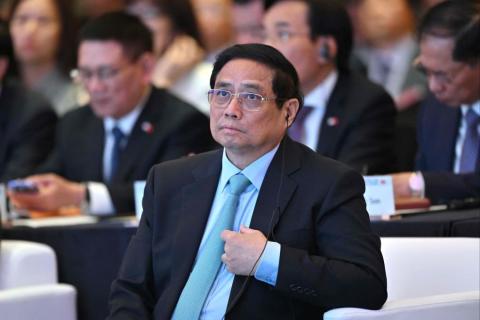
Vietnam officially gained admission to Brics as a “partner country” on Friday, joining a growing group of emerging economies connected to the bloc’s widening agenda urging global cooperation and governance reform.
The announcement came from Brazil, which holds Brics’ rotating presidency in 2025. In a statement, the Brazilian government welcomed Hanoi’s decision, highlighting shared goals of building “a more inclusive and representative international order.”
Vietnam officially gained admission to Brics as a “partner country” on Friday, joining a growing group of emerging economies connected to the bloc’s widening agenda urging global cooperation and governance reform.
The announcement came from Brazil, which holds Brics’ rotating presidency in 2025. In a statement, the Brazilian government welcomed Hanoi’s decision, highlighting shared goals of building “a more inclusive and representative international order.”
Brazil touted Vietnam’s population of nearly 100 million and its “dynamic economy” as key factors in the country’s admission. “Vietnam stands out as a significant player in Asia,” according to the statement. “The country shares with Brics members and partners a commitment to a more inclusive and representative international order.”
“Its efforts in promoting South-South cooperation and sustainable development further strengthen its alignment with the interests of the group,” it added.
The admission makes Vietnam the tenth nation to be designated a Brics partner, joining Belarus, Bolivia, Cuba, Kazakhstan, Malaysia, Nigeria, Thailand, Uganda and Uzbekistan.
Ref : South China Morning Post
Vietnam officially gained admission to Brics as a “partner country” on Friday, joining a growing group of emerging economies connected to the bloc’s widening agenda urging global cooperation and governance reform.
The announcement came from Brazil, which holds Brics’ rotating presidency in 2025. In a statement, the Brazilian government welcomed Hanoi’s decision, highlighting shared goals of building “a more inclusive and representative international order.”
Brazil touted Vietnam’s population of nearly 100 million and its “dynamic economy” as key factors in the country’s admission. “Vietnam stands out as a significant player in Asia,” according to the statement. “The country shares with Brics members and partners a commitment to a more inclusive and representative international order.”
“Its efforts in promoting South-South cooperation and sustainable development further strengthen its alignment with the interests of the group,” it added.
The admission makes Vietnam the tenth nation to be designated a Brics partner, joining Belarus, Bolivia, Cuba, Kazakhstan, Malaysia, Nigeria, Thailand, Uganda and Uzbekistan.
Ref : South China Morning Post
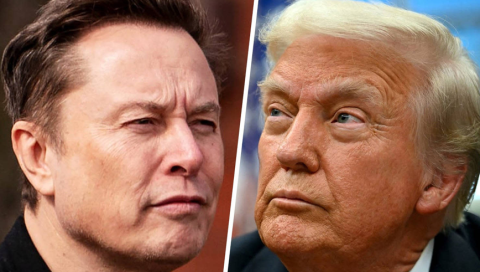
US President Donald Trump says billionaire entrepreneur Elon Musk will have to face "very serious consequences" if he funds opposition Democratic Party candidates in the midterm elections next year.
The relationship between Trump and Musk has been deteriorating over a Republican-led bill including tax cuts. Musk served in a key post in the Trump administration before quitting it late last month.
US President Donald Trump says billionaire entrepreneur Elon Musk will have to face "very serious consequences" if he funds opposition Democratic Party candidates in the midterm elections next year.
The relationship between Trump and Musk has been deteriorating over a Republican-led bill including tax cuts. Musk served in a key post in the Trump administration before quitting it late last month.
In a telephone interview with NBC News on Saturday, Trump was asked if he thought his relationship with Musk is over. Trump said, "I would assume so."
He criticized Musk for being "very disrespectful" of the office of the president.
Citing a senior White House official, Bloomberg reported on Friday that Trump is considering getting rid of the Tesla car he bought to show his solidarity with Musk's electric vehicle firm.
Ref : NHK
US President Donald Trump says billionaire entrepreneur Elon Musk will have to face "very serious consequences" if he funds opposition Democratic Party candidates in the midterm elections next year.
The relationship between Trump and Musk has been deteriorating over a Republican-led bill including tax cuts. Musk served in a key post in the Trump administration before quitting it late last month.
In a telephone interview with NBC News on Saturday, Trump was asked if he thought his relationship with Musk is over. Trump said, "I would assume so."
He criticized Musk for being "very disrespectful" of the office of the president.
Citing a senior White House official, Bloomberg reported on Friday that Trump is considering getting rid of the Tesla car he bought to show his solidarity with Musk's electric vehicle firm.
Ref : NHK
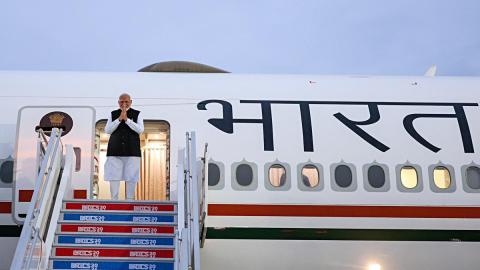
Countering terrorism post Operation Sindoor is a key theme for India; PM’s attendance comes despite U.S. concerns over India’s participation in BRICS and possible initiatives to find alternative trade currencies.
Countering terrorism post Operation Sindoor is a key theme for India; PM’s attendance comes despite U.S. concerns over India’s participation in BRICS and possible initiatives to find alternative trade currencies.
Prime Minister Narendra Modi is expected to travel to Rio De Janeiro next month to attend the BRICS summit, sources said here. The gathering is being closely watched by the U.S. Trump administration that sees it as a counterweight to the G-7 group of developed nations. Russian President Vladimir Putin and Chinese President Xi Jinping are expected to attend, as well as the leaders of Saudi Arabia, the United Arab Emirates, Iran, Egypt, and Indonesia.
Mr. Modi’s attendance at the event comes soon after the four-day conflict with Pakistan, and India’s “new normal” on fighting terror. Any joint statement on cross-border terrorism by the largely economic grouping will be significant for India, officials said. Any meeting with Chinese President Xi Jinping, whom Mr. Modi last met on the sidelines of the previous BRICS summit in Kazan, Russia in October 2024, will also be watched with interest, given China’s support to Pakistan during Operation Sindoor, and plans to reset bilateral ties with the restart of the Kailash Mansarovar Yatra for Indian pilgrims to Tibet in June.
Ref : The Hindu
Countering terrorism post Operation Sindoor is a key theme for India; PM’s attendance comes despite U.S. concerns over India’s participation in BRICS and possible initiatives to find alternative trade currencies.
Prime Minister Narendra Modi is expected to travel to Rio De Janeiro next month to attend the BRICS summit, sources said here. The gathering is being closely watched by the U.S. Trump administration that sees it as a counterweight to the G-7 group of developed nations. Russian President Vladimir Putin and Chinese President Xi Jinping are expected to attend, as well as the leaders of Saudi Arabia, the United Arab Emirates, Iran, Egypt, and Indonesia.
Mr. Modi’s attendance at the event comes soon after the four-day conflict with Pakistan, and India’s “new normal” on fighting terror. Any joint statement on cross-border terrorism by the largely economic grouping will be significant for India, officials said. Any meeting with Chinese President Xi Jinping, whom Mr. Modi last met on the sidelines of the previous BRICS summit in Kazan, Russia in October 2024, will also be watched with interest, given China’s support to Pakistan during Operation Sindoor, and plans to reset bilateral ties with the restart of the Kailash Mansarovar Yatra for Indian pilgrims to Tibet in June.
Ref : The Hindu
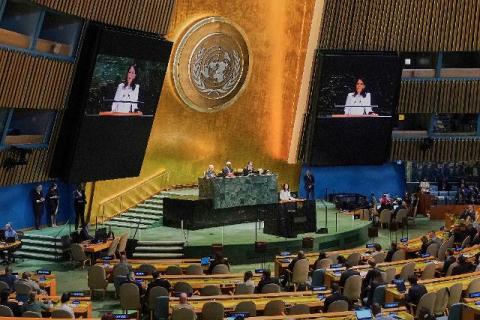
BY EDITH M. LEDERER
Five countries won seats on the United Nations Security Council on Tuesday in uncontested elections and will start serving two-year terms in January on the U.N.’s most powerful but deeply divided body.
The 193-member General Assembly held a secret-ballot vote for the five rotating seats on the 15-member council. Bahrain received 186 votes, Congo 183 votes, Liberia 181 votes, Colombia 180 votes and Latvia 178 votes.
BY EDITH M. LEDERER
Five countries won seats on the United Nations Security Council on Tuesday in uncontested elections and will start serving two-year terms in January on the U.N.’s most powerful but deeply divided body.
The 193-member General Assembly held a secret-ballot vote for the five rotating seats on the 15-member council. Bahrain received 186 votes, Congo 183 votes, Liberia 181 votes, Colombia 180 votes and Latvia 178 votes.
This will be the first time on the council for Latvia, which was forcibly incorporated into the Soviet Union and gained independence again after its collapse in 1991. Latvian Foreign Minister Baiba Braže told reporters after the vote her Baltic nation is ready for the responsibility, saying, “Our historical experience puts us in the position to understand, empathize with, and forge partnerships across every region in the world.”
“We know the value of freedom,” she said. “We know the fragility of peace and the power of multilateralism to safeguard it.”
Braže said Latvia will spare no effort to achieve just and lasting peace in Ukraine and to alleviate suffering in the Middle East, Gaza, Africa and other conflicts around the globe.
Bahrain will be the Arab representative on the council, and Foreign Minister Abdullatif bin Rashid Al Zayani said his country’s election to the council for a second time reinforces its determination to be “a proactive contributor” to international peace and security.
“Our goal is to fortify peace and stability within our region,” Al Zayani said, stressing that resolving the decades-old Palestinian-Israeli conflict is “the cornerstone for achieving peace in the region.”
The immediate requirement, he said, is a ceasefire and massive influx of humanitarian aid into Gaza, the release of all hostages taken from Israel on Oct. 7, 2023, and progress toward a two-state solution and “a viable state of Palestine.”
The Security Council is mandated in the U.N. Charter with ensuring international peace and security, but it has failed in the two major conflicts because of the veto power of Russia on Ukraine and the United States, Israel’s closest ally, on Gaza.
There have been decades of efforts to reform the Security Council to reflect the geopolitical realities of the world in 2025, not of the post-World War II era 80 years ago, when the United Nations was established. But they have all failed.
The council still includes five veto-wielding permanent members — the United States, Russia, China, Britain and France — and 10 elected members from the U.N.’s different regional groups. One major failing is the absence of a permanent seat for Africa or Latin America and the Caribbean.
Under its current rules, five new council members are elected every year. In January, the newly elected countries will replace Algeria, Guyana, South Korea, Sierra Leone and Slovenia.
Foreign Minister Thérèse Kayikwamba Wagner of Congo, which will be serving its third term on the council, told the council its election not only reflects confidence in her country, “it is also a reflection of Africa’s unity and its rightful place in shaping the global peace and security agenda.” Asked about the ongoing fighting by armed groups in the country’s mineral-rich east, she said Congo will bring to the council the knowledge of dealing with decades of conflict, the challenges of U.N. peacekeeping operations and protecting civilians, and “the convergence between conflict, natural resources, and environmental changes.”
Liberia’s Deputy Foreign Minister Deweh Gray, whose country was last on the council in 1961, said her country has “an unwavering resolve to make a difference for all” and to tackle the formidable challenges facing the world including conflict, inequality and climate change, “to name a few.” “Liberia’s vote is a vote for Africa,” she said, “and we shall ensure that we follow the African common position.”
Colombia’s U.N. Ambassador Leonor Zalabata urged all countries to unite and “keep working together in harmony with nature to preserve what we have and build peace in the world.” And she said, “We invite you all to keep working in the path of human rights.”
Ref : AP
BY EDITH M. LEDERER
Five countries won seats on the United Nations Security Council on Tuesday in uncontested elections and will start serving two-year terms in January on the U.N.’s most powerful but deeply divided body.
The 193-member General Assembly held a secret-ballot vote for the five rotating seats on the 15-member council. Bahrain received 186 votes, Congo 183 votes, Liberia 181 votes, Colombia 180 votes and Latvia 178 votes.
This will be the first time on the council for Latvia, which was forcibly incorporated into the Soviet Union and gained independence again after its collapse in 1991. Latvian Foreign Minister Baiba Braže told reporters after the vote her Baltic nation is ready for the responsibility, saying, “Our historical experience puts us in the position to understand, empathize with, and forge partnerships across every region in the world.”
“We know the value of freedom,” she said. “We know the fragility of peace and the power of multilateralism to safeguard it.”
Braže said Latvia will spare no effort to achieve just and lasting peace in Ukraine and to alleviate suffering in the Middle East, Gaza, Africa and other conflicts around the globe.
Bahrain will be the Arab representative on the council, and Foreign Minister Abdullatif bin Rashid Al Zayani said his country’s election to the council for a second time reinforces its determination to be “a proactive contributor” to international peace and security.
“Our goal is to fortify peace and stability within our region,” Al Zayani said, stressing that resolving the decades-old Palestinian-Israeli conflict is “the cornerstone for achieving peace in the region.”
The immediate requirement, he said, is a ceasefire and massive influx of humanitarian aid into Gaza, the release of all hostages taken from Israel on Oct. 7, 2023, and progress toward a two-state solution and “a viable state of Palestine.”
The Security Council is mandated in the U.N. Charter with ensuring international peace and security, but it has failed in the two major conflicts because of the veto power of Russia on Ukraine and the United States, Israel’s closest ally, on Gaza.
There have been decades of efforts to reform the Security Council to reflect the geopolitical realities of the world in 2025, not of the post-World War II era 80 years ago, when the United Nations was established. But they have all failed.
The council still includes five veto-wielding permanent members — the United States, Russia, China, Britain and France — and 10 elected members from the U.N.’s different regional groups. One major failing is the absence of a permanent seat for Africa or Latin America and the Caribbean.
Under its current rules, five new council members are elected every year. In January, the newly elected countries will replace Algeria, Guyana, South Korea, Sierra Leone and Slovenia.
Foreign Minister Thérèse Kayikwamba Wagner of Congo, which will be serving its third term on the council, told the council its election not only reflects confidence in her country, “it is also a reflection of Africa’s unity and its rightful place in shaping the global peace and security agenda.” Asked about the ongoing fighting by armed groups in the country’s mineral-rich east, she said Congo will bring to the council the knowledge of dealing with decades of conflict, the challenges of U.N. peacekeeping operations and protecting civilians, and “the convergence between conflict, natural resources, and environmental changes.”
Liberia’s Deputy Foreign Minister Deweh Gray, whose country was last on the council in 1961, said her country has “an unwavering resolve to make a difference for all” and to tackle the formidable challenges facing the world including conflict, inequality and climate change, “to name a few.” “Liberia’s vote is a vote for Africa,” she said, “and we shall ensure that we follow the African common position.”
Colombia’s U.N. Ambassador Leonor Zalabata urged all countries to unite and “keep working together in harmony with nature to preserve what we have and build peace in the world.” And she said, “We invite you all to keep working in the path of human rights.”
Ref : AP
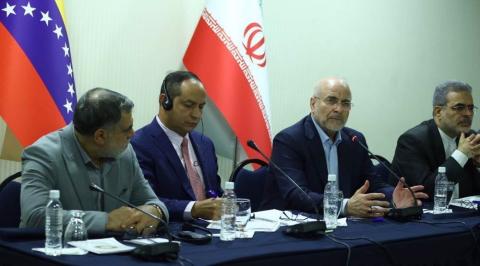
Iranian Parliament Speaker Mohammad Baqer Qalibaf says Tehran and Caracas are determined to expand comprehensive bilateral cooperation, calling for a transition from dollar-based transactions to national currencies and the use of the BRICS Pay system in their trade relations.
Iranian Parliament Speaker Mohammad Baqer Qalibaf says Tehran and Caracas are determined to expand comprehensive bilateral cooperation, calling for a transition from dollar-based transactions to national currencies and the use of the BRICS Pay system in their trade relations.
Qalibaf made the remarks on Sunday during a meeting with Iranian and Venezuelan business leaders and private sector representatives in Caracas. The visit marks the beginning of his three-nation tour of Latin America, which will also take him to Cuba and Brazil to participate in the Parliamentary Forum of BRICS member states.
Emphasizing the need to overcome existing obstacles in banking and finance, Qalibaf highlighted the role of the Iran-Venezuela joint bank and underlined the potential of BRICS Pay — the economic bloc’s alternative to the SWIFT system — to facilitate smoother financial transactions between the two heavily sanctioned nations.
"Replacing the dollar with national currencies and regional payment systems like BRICS Pay can neutralize the impact of foreign pressure on our economies," he said. "Traders and private sector actors in Iran and Venezuela are on the frontlines of the economic war waged by our common adversaries."
The speaker reaffirmed that expanding Iran-Venezuela ties is a definitive policy of the Islamic Republic, and called for the swift implementation of long-term strategic agreements to solidify cooperation across vital sectors. “The more coordinated countries with shared interests and common adversaries are, the more effectively they can capitalize on opportunities and confront threats,” he said.
Qalibaf pointed to wide-ranging areas of cooperation, particularly in oil, energy, and OPEC-related coordination, as key examples of the two countries’ strategic alignment. He also emphasized the importance of leveraging geographic advantages in both countries to bolster economic growth.
The Iranian speaker stressed the urgency of removing banking hurdles and establishing free trade mechanisms to facilitate smoother private sector engagement. He noted that the Iran-Venezuela partnership is grounded in sustainable and logical economic principles based on mutual supply and demand.
In June 2022, Iran and Venezuela signed a 20-year cooperation agreement during Venezuelan President Nicolás Maduro’s official visit to Tehran. The deal includes collaboration in oil, petrochemicals, defense, agriculture, tourism, and culture, and provides for the repair of Venezuelan refineries as well as the export of Iranian technical and engineering services.
Ref : Tehran Times
Iranian Parliament Speaker Mohammad Baqer Qalibaf says Tehran and Caracas are determined to expand comprehensive bilateral cooperation, calling for a transition from dollar-based transactions to national currencies and the use of the BRICS Pay system in their trade relations.
Qalibaf made the remarks on Sunday during a meeting with Iranian and Venezuelan business leaders and private sector representatives in Caracas. The visit marks the beginning of his three-nation tour of Latin America, which will also take him to Cuba and Brazil to participate in the Parliamentary Forum of BRICS member states.
Emphasizing the need to overcome existing obstacles in banking and finance, Qalibaf highlighted the role of the Iran-Venezuela joint bank and underlined the potential of BRICS Pay — the economic bloc’s alternative to the SWIFT system — to facilitate smoother financial transactions between the two heavily sanctioned nations.
"Replacing the dollar with national currencies and regional payment systems like BRICS Pay can neutralize the impact of foreign pressure on our economies," he said. "Traders and private sector actors in Iran and Venezuela are on the frontlines of the economic war waged by our common adversaries."
The speaker reaffirmed that expanding Iran-Venezuela ties is a definitive policy of the Islamic Republic, and called for the swift implementation of long-term strategic agreements to solidify cooperation across vital sectors. “The more coordinated countries with shared interests and common adversaries are, the more effectively they can capitalize on opportunities and confront threats,” he said.
Qalibaf pointed to wide-ranging areas of cooperation, particularly in oil, energy, and OPEC-related coordination, as key examples of the two countries’ strategic alignment. He also emphasized the importance of leveraging geographic advantages in both countries to bolster economic growth.
The Iranian speaker stressed the urgency of removing banking hurdles and establishing free trade mechanisms to facilitate smoother private sector engagement. He noted that the Iran-Venezuela partnership is grounded in sustainable and logical economic principles based on mutual supply and demand.
In June 2022, Iran and Venezuela signed a 20-year cooperation agreement during Venezuelan President Nicolás Maduro’s official visit to Tehran. The deal includes collaboration in oil, petrochemicals, defense, agriculture, tourism, and culture, and provides for the repair of Venezuelan refineries as well as the export of Iranian technical and engineering services.
Ref : Tehran Times


